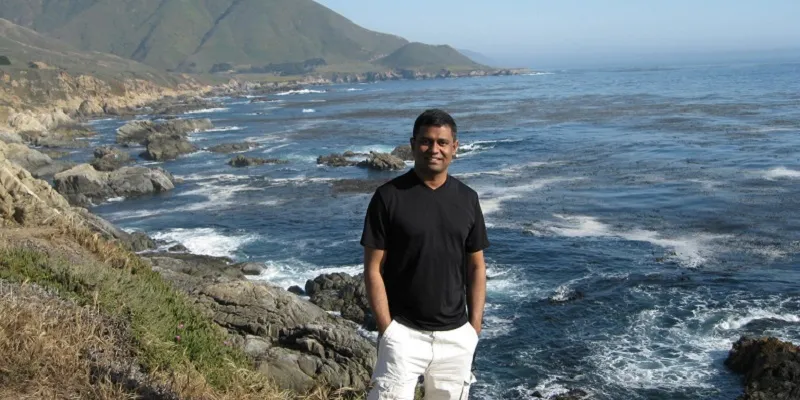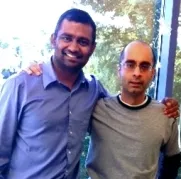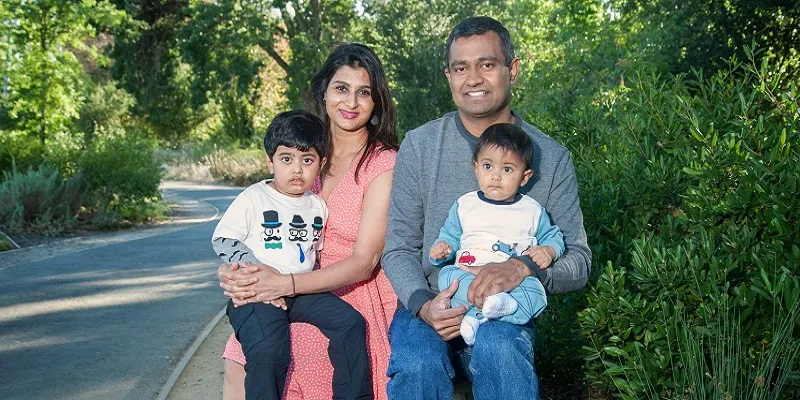This entrepreneur ‘accidentally’ built Gluster, which was acquired by RedHat for $136 million
The world was still reeling from the shock of the 9/11 attacks and the global economy wasn’t prepared for this kind of blow. Yet, for Anand Babu (AB) Periasamy and his team at California Digital Corporation (CDC), it was a crucial time that was spent building ‘Thunder’ – the world’s fastest super computer for the US Department of Energy. From building a supercomputer to founding Gluster and now Minio, it has been a long journey for AB from Mettur Dam in Tamil Nadu.
“My entrepreneurial journey has been a battle with more scars than skin,” says AB. Seated in a crowded room waiting for a fireside chat, it is difficult not to be enthralled by AB’s enthusiasm and sense of wonder. For AB, his entrepreneurial journey has just been an accidental one. He, in fact, never wanted to be an entrepreneur.

One look at the CPU and it was love at first sight
“If I were left to my devices, I would be in a quiet room simply hacking Open Source. I don’t consider myself smart. In fact, I wouldn’t even have done my engineering if it hadn’t been for my mother’s support and encouragement. It was her dream that I become an engineer,” adds AB.
His love for computers and Open Source began in the ninth grade, when he first saw a computer. Defining it as love at first sight, AB says that the only thing he wanted was making machines do his bidding. Ever since, it has been his endeavour to know everything about computing.
All AB needed was a computer with good Internet access. He even hacked his way into getting this in 1999. While working at NextGen in Delhi, the Internet was limited to a few employees. So, when the service would start in the evening, and the port numbers restricted, AB would hear the modem sound, detect the port scan and connect to the service. Soon, people started asking for help and AB even ran a proxy service on his machine.
Survival of the fittest
“At one point, I decided to go to the IT department and tell them we could do a better job. I reworked the infrastructure and installed Linux, which made the system better. Soon, I took over the IT department,” adds AB. Interestingly, AB’s entrepreneurial journey began with an idea to do social service. Coming down to Bengaluru, AB and his friend embarked on an endeavour to bring the Internet to rural India.
Hailing from modest backgrounds, both AB and his friend knew that they needed jobs to survive. This is when the opportunity at CDC happened. AB decided to join part time, but soon joined full time as CTO. AB took on the job full time because had had brought in other people who were hacking on free software, so now he had their responsibility as well.
While things were going smoothly and the team was getting big clients, the CEO of CDC decided to shut the hardware and free software business and focus on the proprietary software business. Now unemployed, and with a team that was his responsibility, AB knew he had to find a job not just for himself, but his team as well.

He attended several interviews, but nobody was working on free software at the time, and AB was only interested in hacking free software. “If you tell me I can’t share my ideas and it’s restricted, it just doesn’t make any sense to me. I just cared about hacking on free software,” adds AB. So AB and his colleague Hitesh Chellani – the last two people at CDC – were forced to start a company.
Building a core offering in free-time
Taking in some angel funding from Hitesh’s brother-in law, the duo started Gluster in a small bedroom. Ironically, the storage software was built during what AB calls ‘their free-time.’ “We were doing all kinds of work like embedded systems porting and anything to keep our burn low, and the storage work was done in our free time,” says AB.
It was only in the end of 2007 and early 2008 that they realised that the market was warming up to the idea of the cloud storage platform. Coincidently, when Gluster took off, the housing bubble burst in the US, and the market went from bad to worse.
While, every other storage company was building proprietary hardware appliances and had spent great deal of money building a seasoned executive team, the Gluster team was small and had zero storage experience.
While the competition was talking about EMC certification, their model was simple – you had to download the software and use it. It was free and built on Open Source. Then, in what was possibly the worst market scenario, Gluster got funding from Nexus Venture Partners.
“By 2010, the industry started calling us the RedHat of Storage. And then RedHat told us you should be RedHat Storage and the company got acquired”. AB adds that times were rough, and he was living in a one-bedroom apartment and driving an old Cadillac. “For me, nothing else mattered and it was matter of ethics hacking on free values. There were times when I would stay in server rooms so that I could hack,” he says.

Co-founders for life
After RedHat, where AB worked for three years to help with the transition, he just wanted to sit at home, drink lot of coffee, and teach himself theoretical mathematics. “I just wanted to learn and solve different problems in Mathematics and Physics. I wanted to do fun projects like Bionics, and taking human intelligence to the next level,” says AB.
He thought that if he didn’t work on another startup, he may as well stay at RedHat and take the retention bonus. Around the time the deadline was approaching, his next startup– Minio.io – took shape.
Against all his plans and ideas, AB re-entered the entrepreneurial fray. And this time, it was for his wife.
“It is my responsibility to be involved in her accomplishments as well. My wife was very instrumental in my life, apart from my day to day struggle and bringing in the discipline, she worked as my co-founder at every step. She gave new perspectives and made me see the right choices,” says AB.

While he started to work on a bionics idea, AB realised that it would require resources, time and research. So he picked another problem and decided to build an open source Amazon S3 alternative. The key difference is that Minio is free and easy and even a beginner developer can download it.
“You would think that an entrepreneur is just creating things, but in reality, it is just a small part of his or her world. Entrepreneurship is about managing people and making sure that everyone else is successful along with you,” says AB.







